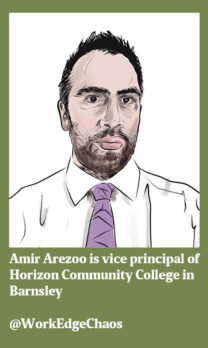My teaching hall of shame
Bob Pritchard @rjpritchard
There comes a time as a teacher where you start to hone your practice to include elements that you know have a massive impact. During this process of approaching pedagogical nirvana, however, there are also moments where you reflect on certain lessons and say to yourself “what was I thinking?” Bob Pritchard talks about such past experiences. He doesn’t just say “this lesson didn’t go well”, but sets out why the idea that seemed so good at the time turned out to be a bit silly in hindsight. What’s most striking is that these “shameful” examples are born of strategies supposed to solve a multitude of problems, but poorly implemented (for example, “we have this ICT resource, we need to use it”). That’s the value of experience: an air of caution is never far away.
Keeping everyone on the knowledge bus
The Quirky Teacher @iQuirky_Teacher
The debate about curriculum appears to have shifted from what is being covered to how it is covered. @iQuirky_Teacher highlights this when she focuses on how schools can best meet the needs of SEND students in terms of knowledge acquisition. She suggests that it is better to provide these students with lesson material in advance as a de facto “intervention”, rather than having to rely on support in the class session to deal with the “cognitive load”. The latter, she argues, leads to more passive and reliant behaviour. I feel this approach is problematic on two counts. First, as the blogger acknowledges, time is precious for a teacher, yet the solutions proffered here seem to depend on teachers finding the time, particularly before the start of the school day, to teach SEND children before the main class. Second, SEND students seem to be considered as a homogeneous unit when they simply are not. The approach required to support them therefore shouldn’t be singular either.
Curriculum: an experiment that worked
Paul G Moss @EDmerger
It’s interesting and refreshing to come across discussions and posts that remind us that knowing “stuff” matters. Currently I’m reading Matt Pinkett and Mark Roberts’ engaging Boys Don’t Try?, which implores the reader (rightly) to invest cultural capital in male (and, contrary to the title of their book, female) students to raise aspirations and provide them with a foundation to succeed in an increasingly demanding educational world.
In a similar fashion, Paul G Moss focuses on the means of ensuring that students have the capacity to manage their learning and become successful by amassing subject knowledge and providing themselves with a platform to apply skills in context. For example, one cannot form views on capital punishment from religious beliefs if you don’t fully know what principles those beliefs are grounded on. Moss demonstrates this with lots of practical examples. What I particularly liked is his emphasis on the untold benefits of making it clear to students that they are being invested in and why, so that “they could participate because the curriculum had been designed to incrementally breed success”. Brilliant.
Calculator woes
Jo Morgan @resourceaholic
Teachers know this: your students may look at a calculator and think, “behold, this device will surely demolish my problems with this sum I see before me”. But there is a problem: how do they know that what they type into said device is correct and how do they know that said device is telling them the right answer? It would be great for teachers to take heed of Jo Morgan’s advice and make sure that students know how to use this important tool, particularly given the increased numerical demand on subjects, such as statistics in design technology and geography, for example, across the secondary curriculum.













Your thoughts